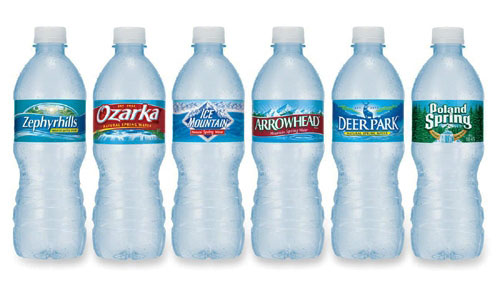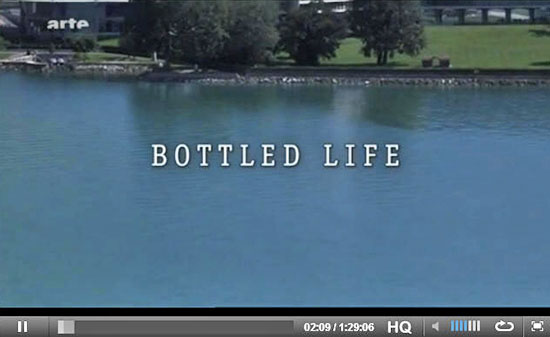
Description
from
BottledLifeFilm Website
Do you know how to turn ordinary water into a billion-dollar business? In
Switzerland there's a company which has developed the art to perfection -
Nestlé. This company dominates the global business in bottled water.
Swiss journalist Res Gehringer has investigated this money-making phenomena.
Nestlé refused to cooperate, on the pretext that it was,
"the wrong film at
the wrong time".
So Gehringer went on a journey of exploration, researching
the story in the USA, Nigeria and Pakistan.
His journey into the world of
bottled water reveals the schemes and strategies of the most powerful food
and beverage company on our planet.
Ten things you should know
-
Bottled water is one of the company's key strategic money makers: Nestlé has
an annual turnover of CHF 110 billion - of which almost 10% is derived from
the bottled water business.
-
Nestlé has achieved world dominance in the bottled water business
- by
taking over such leading brands as Perrier.
-
Nestlé is constantly buying up additional valuable groundwater resources
- in order to satisfy the massive demand it has created for bottled water.
-
Nestlé is taking advantage of the often out-of-date water rights in many
locations by operating to the limits of legality - not only in developing
countries but also in the USA and elsewhere in the industrialized world.
-
Nestlé spares no effort in exerting financial, legal and political pressure
- on anyone campaigning for water ownership as a public property and human
right.
-
Nestlé is using up precious natural water resources
- to create and
commercialize "new" water.
-
Nestlé promotes bottled water with extensive global marketing and
advertising campaigns - undermining awareness for the necessity of a
functioning public water supply system.
-
Nestlé promotes itself as a benefactor - by donation and PR campaigns at
local level. But at the same time it manipulates public opinion into
believing that improvements in production and distribution are having a
sustainable effect.
-
Nestlé creates dependence on bottled water
- in particular where public
waters supplies are close to collapse, and notably in developing countries.
-
Nestlé's bottled water business is not simply a business like any other
- it
is a business with the sole natural resource essential for man's survival.
Nestlé and water
Company founder dealt in water as early as 1843.
In 1843, Henri Nestlé - pioneer of milk powder for babies - set up a water
factory in Vevey on Lake Geneva. From piped water he created and
commercialized “mineral water”, selling his product to local restaurants.
Later in life he purchased a retirement residence in nearby Glion, where he
also acquired water rights.
He used the water for his home and extensive
gardens, donating the rest to the local population.
Nestlé on a shopping spree - from Vittel to Perrier and San Pellegrino
In 1969 Nestlé acquired a
holding in the French company, Société Générale des Eaux Minérales de Vittel.
That was the company's entry into the world of water. And bottled water in
particular.
In 1976 world market leader Perrier (then a French company with tradition)
entered the US market. Nestlé took over distribution of Perrier's popular
teardrop-shaped bottles - and watched and wondered as the Perrier product
quickly made its mark on young urban America.
Bottled water soon became an attractive alternative to sweetened soft drinks
such as Coca Cola and Pepsi. It was thirst-quenching, calorie-free and in
keeping with the trend towards more healthy nutrition. The bottled water
industry expanded, sales were soon soaring.
In 1989 Nestlé Chairman Helmut Maucher and Head of Marketing Peter Brabeck
decided to make bottled water production a priority, with the aim of
becoming world leader. Nestlé launched a takeover bid for Perrier and after
a bitter battle won control of the French company.
With the acquisition of
Perrier, many regional brands in the USA - among them popular Poland Spring
- also came under the control of Nestlé.
As with Perrier, Nestlé also swallowed up the Italian San Pellegrino brand
in 1997.
One water for the whole world - Pure Life

Nestle Waters Pure Life
Source
-
Vittel
-
Perrier
-
San
Pellegrino,
...are mineral waters which come from a single specific source.
Poland Spring and other regional US brands are described by Nestlé as
natural spring water. These waters come from different sources which are
often a long distance from each other.
Mineral and natural spring waters are targeted mainly at consumers with
higher purchasing power or (in developed countries) at a broad middle class.
In 1997 Nestlé started to develop a new product created from purified ground
water enriched with a new special mix of minerals. The advantage of this
water is that it can be produced worldwide with the same taste.
The name - Nestlé Pure Life. With this product Nestlé began targeting
a vast new
market, namely consumers in developing countries.
Today, Pure Life is the
top selling bottled water on the planet.
Video Clip
by
DokLabCom
December 14, 2011
from
YouTube Website
The Film
Bottled Life (German - partially English)
by
bdose
2015
from
Veoh
Website




